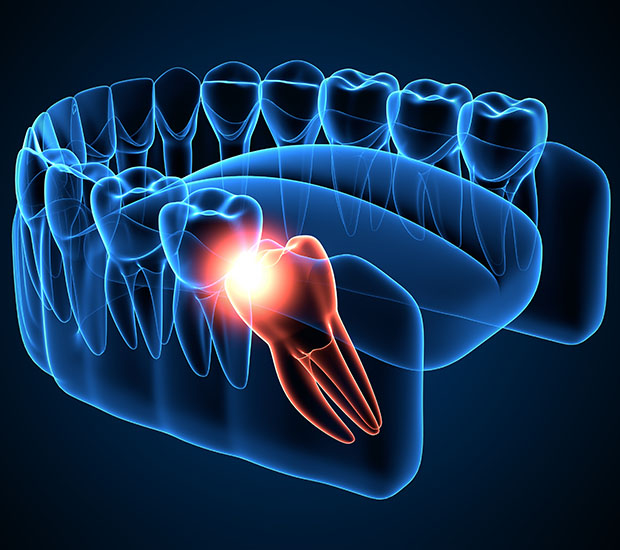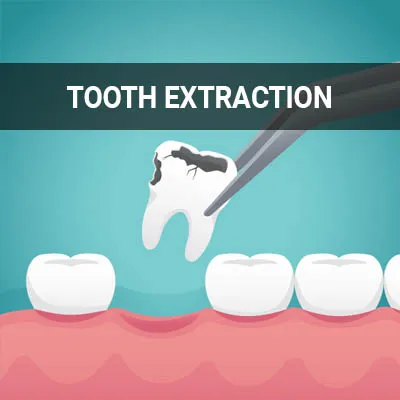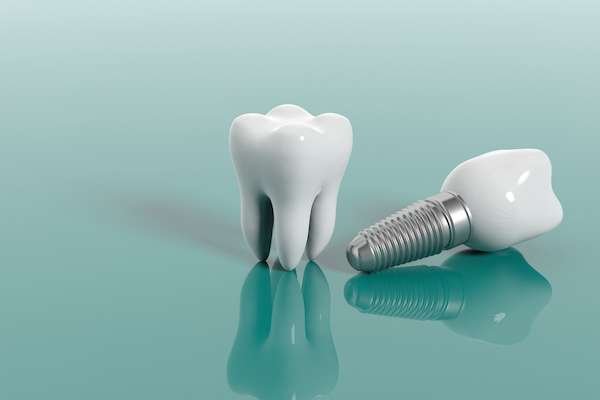Wisdom Teeth Extraction Weymouth, MA
Wisdom teeth extractions are a fairly common procedure that helps alleviate pain or pressure associated with improperly developing wisdom teeth. Extracting the wisdom teeth becomes necessary when the surrounding teeth, gums, and bone are at risk because of the way the wisdom teeth have erupted or are erupting. Early detection of their development can greatly reduce healing time and improve a patient's overall oral cavity.
Wisdom teeth extractions are available at Dr. Frederick F. Nafash and Associates in Weymouth and the surrounding area. We can help determine whether an extraction is recommended or necessary. We can also discuss other alternative treatments and help you decide the best route for you. Call us today at (617) 982-1649 to schedule an appointment or learn more about our services.
Understanding Wisdom Teeth Extraction
"Wisdom teeth" is the colloquial term for the third set of molars that sit in the back of the mouth. They are called such because they come between the more "mature" ages of 17 and 21. The emergence of wisdom teeth can be uncomfortable, even if they are emerging correctly. Wisdom teeth do not always necessitate extraction. On the contrary, properly aligned wisdom teeth may assist in chewing.
However, if there is no adequate space for the wisdom teeth to emerge or if the teeth are coming through in the wrong position, they may become impacted (or trapped in the jaw or under the gums). This may cause cysts, damage to neighboring teeth, gum disease, infection, pain, tooth, decay, and tumors. A dentist needs to monitor the patient's wisdom teeth and determine the best course of action.
“”Wisdom teeth” is the colloquial term for the third set of molars that sit in the back of the mouth.”
What to Know Before Wisdom Teeth Extraction
Wisdom teeth extraction is commonly performed and generally safe when carried out by qualified doctors. However, like any other surgery, it does carry a small risk of complications. These include bleeding, dry socket, and infection. Our team will do everything we can to minimize these risks even further. However, patients should contact our office immediately if they find themselves experiencing any of the following symptoms after their extraction:
- Absent or dislodged blood clot at the extraction site after surgery
- High temperature
- Yellow or white discharge from the extraction site
- Persistent pain and swelling
- Persistent, heavy bleeding that does not subside over time
- Throbbing pain in the gum or jaw
- Unpleasant smell or taste in the mouth
Most potential complications following wisdom teeth extraction are easily treatable when reported to the doctor.
“Wisdom teeth extraction is commonly performed and generally safe when carried out by qualified doctors.”
Preparing for an Extraction
Since an extraction is considered a surgery, it is common for patients to be nervous before their procedure. However, wisdom teeth extractions are quite common, with dentists performing this type of procedure many times a week. It is a good idea for patients to understand what their treatment will entail and properly prepare for it ahead of time.
During the initial consultation, we ask that patients be as open as possible in relaying their symptoms and health history. This allows us to determine whether extraction is safe and to take any necessary precautions during the procedure. Avoid smoking or drinking alcoholic or acidic beverages for at least eight hours before the procedure. Clean the mouth thoroughly and drink only water an hour or two before the procedure. We will administer a local or general anesthetic prior to the procedure, keeping the patient calm and relaxed.
“Avoid smoking or drinking alcoholic or acidic beverages for at least eight hours before the procedure.”
Check out what others are saying about our dental services on Yelp: Wisdom Teeth Extraction in Weymouth, MA
What to Expect During Wisdom Teeth Extraction
Generally, wisdom teeth extraction begins with the doctor injecting the patient with a local anesthetic to numb them to the pain of the procedure. The doctor will then cut into the gum tissue to expose the tooth and bone, making sure to remove any bone blocking access to the tooth root. Depending on how severely impacted the tooth is, the tooth may be divided into sections to be removed little by little.
After extracting the tooth, the doctor will clean the extraction site of any debris. Afterward, the wound may or may not need stitches, and the doctor will pack gauze over the extraction site to control bleeding and to aid in the formation of a blood clot.
“After extracting the tooth, the doctor will clean the extraction site of any debris.”
Questions Answered on This Page
Q. What are the potential risks of wisdom teeth extraction?
Q. How can I prepare for an extraction?
People Also Ask
Q. What happens during a tooth extraction procedure?
Aftercare for Wisdom Teeth Extraction
Patients should expect to rest for the remainder of the day following their wisdom teeth extraction. Though regular activities can be resumed as soon as the day after, patients should refrain from any strenuous activity for at least a week following their procedure. Otherwise, they run the risk of overexertion and dislodging the blood clot. Our team will provide patients with a customized recovery plan for their specific procedures.
Complications following wisdom teeth extraction are rare as long as patients follow this plan. However, patients should contact us immediately if they are experiencing any of the following:
- Blood or pus in nasal discharge
- Difficulty swallowing or breathing
- Excessive bleeding
- Fever
- Foul taste in the mouth
- Persistent numbness or loss of feeling
- Pus in or oozing from the socket
- Severe pain that does not subside
- Swelling that does not subside after two or three days
“Though regular activities can be resumed as soon as the day after, patients should refrain from any strenuous activity for at least a week following their procedure.”
Frequently Asked Questions
Q. What is the average age of patients who remove their wisdom teeth?
A. Wisdom teeth generally erupt between the ages of 17 and 21 but can also come out later in life. We like to examine all patients from the age of 17 onwards to monitor their tooth development and detect wisdom teeth eruption as soon as it occurs.
Q. How do I know if my extraction site is healing correctly?
A. Recovery time after an extraction is between three to five days, wherein the socket should begin to close in. It could take about a month or two for the entire site to close. However, if the gums look and feel normal (no swelling or redness), the site should be healing correctly. We like to schedule follow-ups after an extraction to make sure the site is healing properly.
Q. How can I detect dry socket if I do not have pain?
A. In most cases, patients will experience pain from a dry socket. They may also experience a foul smell or notice exposed bone. A dry socket occurs when a blood clot was dislodged earlier than necessary or did not form at all, exposing the bone underneath. Therefore, if a blood clot is not present, a dry socket is very likely.
Q. Can I drive myself back home after wisdom teeth extraction?
A. Patients undergoing a simple extraction with local anesthesia can drive back home as they will only feel numb in the mouth. However, surgical extractions with general or IV anesthesia will need to be driven back after the procedure as they will not be fully alert. We will discuss this during the consultation appointment prior to the procedure.
Q. Can I remove all four wisdom teeth in the same visit?
A. Patients that need all of their wisdom teeth removed can have them all removed in one visit. We may also recommend extracting two on the same side during each visit as the entire area will be numbed anyway. This will reduce the cost, recovery time, and discomfort associated with each extraction.
Dental Terminology
Helpful Related Links
- American Dental Association (ADA). Glossary of Dental Clinical Terms. 2025
- American Academy of Cosmetic Dentistry® (AACD). Home Page. 2025
- WebMD. WebMD’s Oral Care Guide. 2025
About our business and website security
- Dr. Frederick F. Nafash and Associates was established in 1990.
- We accept the following payment methods: American Express, Cash, Check, Discover, MasterCard, and Visa
- We serve patients from the following counties: Norfolk County, Suffolk County and Plymouth County
- We serve patients from the following cities: Braintree, Quincy, Milton, Weymouth, Dorchester, Hingham, Canton, Boston, Westwood and Rockland
- National Provider Identifier Database (1841441649). View NPI Registry Information
- Healthgrades. View Background Information and Reviews
- Norton Safe Web. View Details
- Trend Micro Site Safety Center. View Details
Back to top of Wisdom Teeth Extraction











